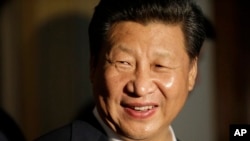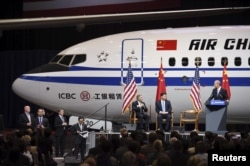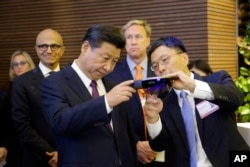Chinese President Xi Jinping heads to Washington Thursday for talks with President Barack Obama on thorny issues including cyberattacks, human rights and economics, after spending the first two days of his U.S. visit focused primarily on the importance of cooperation between the two countries.
On Wednesday, Xi met the top leaders of some of America's largest tech companies, including Amazon, Apple, Microsoft, Boeing and Facebook.
The Chinese leader assured them he is committed to improving intellectual property rights and making it easier for foreign companies to do business in China.
"We are working to create a new open economic system, push forward reform of foreign investment management, and greatly reduce the restrictions on foreign investment," Xi told the executives, before touring Microsoft's campus and visiting a nearby Boeing factory.
Boeing and Xi used the opportunity to announce that Chinese companies have agreed to buy 300 jets from the U.S. airplane maker.
The deal for 250 single-aisle 737s and 50 widebody jets carries a list price of about $38 billion. It also calls for the U.S. aerospace giant to build a plant in China.
Cyberattacks
U.S. business leaders are seeking personal assurances from Xi that their companies will be treated fairly when they do business in China, and that Beijing will scale back its alleged large-scale cybertheft of commercial secrets that has cost American companies billions of dollars in recent years.
In a major policy speech Tuesday, Xi said China was open to more cooperation with the U.S. on preventing cyberattacks. He also repeated his government's usual statement that China is the victim, and never the perpetrator, of such attacks.
Obama, who said he is considering U.S. sanctions against China in response to the attacks, has vowed to make cybercrimes a top item on the agenda when he meets with his Chinese counterpart.
The two leaders will gather late Thursday for a private dinner, before a public welcoming ceremony Friday at the White House.
The visit will culminate later Friday with a glitzy state dinner on the White House grounds, an honor usually reserved for the U.S.' top allies and partners.
South China Sea
Another area of disagreement expected to be discussed is China's controversial territorial claims in the South China Sea.
Most pressing is China's island-building efforts in the Spratly Islands chain, parts of which are also claimed by the Philippines, Vietnam, Malaysia, Brunei and Taiwan.
The U.S. has demanded China stop those activities, calling them out of step with international norms and a risk for sparking conflict in the region.
Earlier this week, Xi told The Wall Street Journal that the Spratly Islands have been Chinese territory since ancient times.
"China's development and maintenance of facilities on some of our garrisoned islands and reefs in the Nansha Islands does not impact on or target any other country, and it should not be overinterpreted," Xi told the paper, using the Chinese name for the islands.
In his speech Tuesday, Xi stressed that China does not want confrontation with other nations, and does not want to impede freedom of navigation in the region.
Human rights
China's human rights record is another source of friction, and several rights groups are urging Obama to not shy away from the issue during his meetings with Xi.
"It's a big and complicated relationship, and so there are a lot of topics vying for attention," said Sophie Richardson, China director at Human Rights Watch. "But we certainly think that the deterioration of the rights situation in China under Xi merits special attention."
When the Chinese leader spoke Tuesday in Seattle, dozens of protesters gathered to condemn what they see as Beijing's harsh policies in Tibet and its crackdown against other political dissidents.
Xi is also likely to experience protests in Washington and in New York, where he plans to address the U.N. General Assembly on Monday.
National Security Advisor Susan Rice said earlier this week U.S. officials will continue to push China to stop detaining activists, to allow more freedom of speech and to eliminate restrictions on religious practices.
Cooperation
Despite the multitude of disagreements, one area of cooperation expected to be highlighted by the two leaders is climate change.
During Obama's visit to Beijing last year, the two countries agreed to reduce climate change-causing greenhouse gas emissions. The agreement was seen as a landmark moment for the world's two worst polluters.
The two sides will also attempt to find common ground on how to deal with North Korea, which is continuing to advance its nuclear weapons program and is threatening to carry out a satellite launch, which many say is a disguised long-range missile test.
North Korea is barred from conducting nuclear or missile tests under U.N. Security Council resolutions. Pyongyang is a close ally of Beijing, and any efforts to rein it in are seen as depending largely on cooperation from China.







